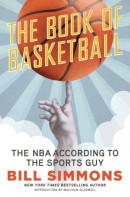A weekly roundup of noteworthy reviews from other sources.
 Josh Levin reviews Bill Simmons’ latest, saying it represents the wildly popular sports writer “at his best and worst”: “The Book of Basketball mostly fulfills the writer’s preposterous aim to relate the entire history of the league, lay out the philosophical underpinnings of winning basketball teams, and rank history’s top 96 players. At the same time, The Book of Basketball exacerbates the worst tendencies of a writer who’s never mistaken brevity for wit.” . . . At Bookforum, John Banville is mostly happy about the much-discussed decision to publish Nabokov’s unfinished novel: “This edition is a triumph of the book maker’s art, and the design, by the Nabokovianly named Chip Kidd, is masterly. There will be those who will deplore the production as gimmicky, but the greatest magicians depend on gimmicks for their most elegant illusions.” . . . Second Pass contributor John Davidson weighs in on Philip Roth’s latest, concluding that “there is a nagging sense in [Roth’s] most recent work of ideas left incomplete, of characters and themes that haven’t been fully developed.” . . . The Economist praises a new history of the Arabs: “It is not a particularly happy story, but it is a fascinating one, and exceedingly well told.” . . . Steve Fraser assesses a biography of Cornelius Vanderbilt, the latest in a new literary genre: “Arguably, the genre of the misunderstood robber baron is itself an expression of the shift in the zeitgeist, just as [the] earlier literature of moral condemnation shared in a more universal set of reservations about the reign of big business. . . . Whatever their Weltanschauung, many of these studies are first-rate histories, and The First Tycoon, a new biography of Cornelius Vanderbilt by T.J. Stiles, is no exception.”
Josh Levin reviews Bill Simmons’ latest, saying it represents the wildly popular sports writer “at his best and worst”: “The Book of Basketball mostly fulfills the writer’s preposterous aim to relate the entire history of the league, lay out the philosophical underpinnings of winning basketball teams, and rank history’s top 96 players. At the same time, The Book of Basketball exacerbates the worst tendencies of a writer who’s never mistaken brevity for wit.” . . . At Bookforum, John Banville is mostly happy about the much-discussed decision to publish Nabokov’s unfinished novel: “This edition is a triumph of the book maker’s art, and the design, by the Nabokovianly named Chip Kidd, is masterly. There will be those who will deplore the production as gimmicky, but the greatest magicians depend on gimmicks for their most elegant illusions.” . . . Second Pass contributor John Davidson weighs in on Philip Roth’s latest, concluding that “there is a nagging sense in [Roth’s] most recent work of ideas left incomplete, of characters and themes that haven’t been fully developed.” . . . The Economist praises a new history of the Arabs: “It is not a particularly happy story, but it is a fascinating one, and exceedingly well told.” . . . Steve Fraser assesses a biography of Cornelius Vanderbilt, the latest in a new literary genre: “Arguably, the genre of the misunderstood robber baron is itself an expression of the shift in the zeitgeist, just as [the] earlier literature of moral condemnation shared in a more universal set of reservations about the reign of big business. . . . Whatever their Weltanschauung, many of these studies are first-rate histories, and The First Tycoon, a new biography of Cornelius Vanderbilt by T.J. Stiles, is no exception.”

